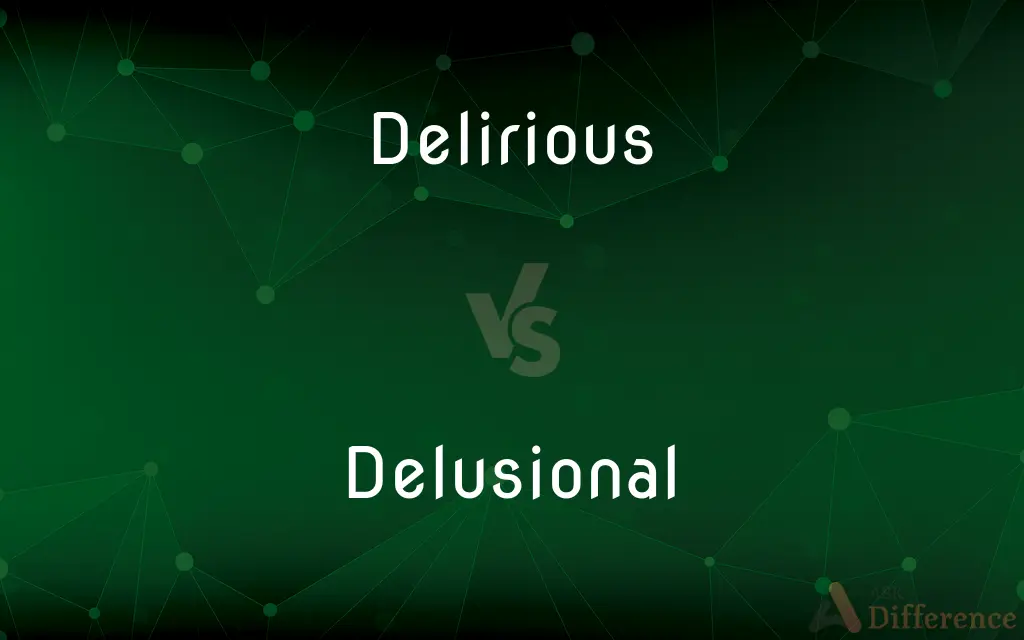Delirious vs. Delusional — What's the Difference?
By Maham Liaqat & Fiza Rafique — Updated on April 22, 2024
Delirious is a disturbed state of mind resulting from illness or intoxication, marked by restlessness, illusions, and incoherence. Delusional pertains to holding firm beliefs despite clear evidence to the contrary, often linked to psychiatric conditions.

Difference Between Delirious and Delusional
Table of Contents
ADVERTISEMENT
Key Differences
Deliriousness is a temporary and acute condition often caused by fever, intoxication, or certain medical conditions, leading to confusion, disorientation, and sometimes hallucinations or vivid illusions. Delusional, on the other hand, describes a state of mind where an individual firmly holds onto beliefs that are contradicted by reality or rational argument, often due to a mental health disorder such as schizophrenia or a delusional disorder.
Delirious individuals may experience altered perceptions and find it hard to maintain coherent thoughts or engage in logical conversations. Delusions are typically persistent and not easily swayed by evidence to the contrary. These beliefs can encompass a wide range of themes, from grandiose notions about one's power or importance to paranoid fears of being persecuted or harmed by others.
While deliriousness affects the general clarity of thought and consciousness, often leading to incoherent speech and impaired cognition that fluctuates over short periods, delusional thinking is more structured around specific false beliefs that remain consistent over time. Delusions do not necessarily affect one's level of consciousness or coherence but rather the content of their beliefs and interpretations of reality.
The key difference lies in their root causes and manifestations: deliriousness is a transient, confused state often linked to physical health issues, whereas delusional thinking is a symptom of psychiatric conditions, characterized by fixed, false beliefs.
Comparison Chart
Definition
A disturbed state of mind with confusion, restlessness, and sometimes hallucinations.
Firm belief in something contradicted by reality.
ADVERTISEMENT
Cause
Often due to fever, intoxication, or medical conditions.
Typically related to mental health disorders.
Symptoms
Incoherence, disorientation, fluctuating consciousness.
Persistent false beliefs, unaffected by contrary evidence.
Consciousness
Fluctuating levels of consciousness.
Generally stable consciousness.
Duration and Stability
Temporary and reversible with treatment.
Persistent and stable over time.
Compare with Definitions
Delirious
Showing signs of excitement or restlessness that lack clear reasoning.
The crowd was delirious with joy after the last-minute goal.
Delusional
Pertaining to or affected by delusions.
The patient's delusional thoughts made treatment challenging.
Delirious
Experiencing confusion and disorientation, often due to high fever.
After days of high fever, the patient became delirious.
Delusional
Holding onto beliefs clearly contradicted by rational evidence.
Despite the clear evidence, he remained delusional about his company's success.
Delirious
In a state of frenzied excitement or wild enthusiasm.
The fans were delirious at the concert, singing along to every song.
Delusional
Characterized by or holding idiosyncratic beliefs or impressions that are contradicted by reality.
She was delusional in thinking she could trust her deceitful friend.
Delirious
Of, suffering from, or characteristic of delirium.
Delusional
The act or process of deluding.
Delirious
Marked by uncontrolled excitement or emotion; ecstatic
Delirious joy.
A crowd of delirious baseball fans.
Delusional
The state of being deluded.
Delirious
(symptom) Being in the state of delirium.
Delusional
A false belief or opinion
Labored under the delusion that success was at hand.
Delirious
Having uncontrolled excitement; ecstatic.
Delusional
(Psychiatry) A false belief or perception that is a manifestation of a mental illness
Delusions of persecution.
Delirious
Having a delirium; wandering in mind; light-headed; insane; raving; wild; as, a delirious patient; delirious fancies.
Delusional
Suffering from delusions; having false or faulty beliefs.
You're delusional if you think that plan will work.
Delirious
Experiencing delirium
Delusional
Being or relating to a delusion.
Delirious
Marked by uncontrolled excitement or emotion;
A crowd of delirious baseball fans
Something frantic in their gaiety
A mad whirl of pleasure
Delusional
A person suffering from a delusion.
Delusional
Of or pertaining to delusions; as, delusional monomania.
Common Curiosities
Are delusional beliefs always a sign of a mental health disorder?
While delusional beliefs are commonly associated with psychiatric conditions, not every instance of delusional thinking indicates a serious mental health disorder. Context and degree matter significantly.
What is the main difference between being delirious and delusional?
The main difference lies in their causes and manifestations: deliriousness is a temporary, confused state often due to physical conditions, while delusional thinking involves persistent false beliefs usually linked to psychiatric disorders.
How are delirious states treated?
Delirious states are treated by addressing the underlying cause, such as reducing fever, treating infections, or stopping substance use.
Can a person be both delirious and delusional?
Yes, a person can exhibit both conditions, especially if a mental health disorder is complicated by a physical health issue causing delirium.
Is delirium always reversible?
Delirium is generally reversible with appropriate treatment of the underlying cause, though recovery times can vary.
What kinds of delusions might a delusional person experience?
A delusional person might experience a range of delusions, from paranoid beliefs about being persecuted to grandiose beliefs about personal abilities or status.
Can stress cause delirium or delusional thinking?
While stress alone typically does not cause delirium or delusional thinking, it can exacerbate underlying conditions that might lead to these states.
Do cultural beliefs affect the interpretation of delusional thoughts?
Yes, cultural context can influence what is considered delusional, as beliefs vary widely across different societies and what might be seen as delusional in one culture could be accepted in another.
How do medical professionals distinguish between delirious and delusional patients?
Through clinical assessment, focusing on the patient's history, symptoms, level of consciousness, and the persistence of their beliefs or confusion.
Is it possible to reason with a delusional person?
Reasoning with a delusional person can be challenging, as their beliefs are firmly held despite evidence to the contrary. Professional psychiatric help is often necessary.
Share Your Discovery

Previous Comparison
Defatigable vs. Fatigue
Next Comparison
Gummy vs. PastilleAuthor Spotlight
Written by
Maham LiaqatCo-written by
Fiza RafiqueFiza Rafique is a skilled content writer at AskDifference.com, where she meticulously refines and enhances written pieces. Drawing from her vast editorial expertise, Fiza ensures clarity, accuracy, and precision in every article. Passionate about language, she continually seeks to elevate the quality of content for readers worldwide.
















































